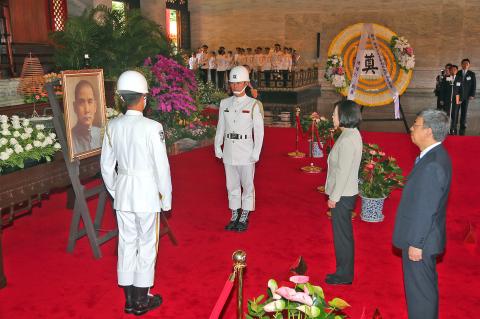President Tsai Ing-wen (蔡英文) yesterday upheld precedent and paid tribute to Republic of China (ROC) founding father Sun Yat-sen (孫逸仙) at the National Revolutionary Martyrs’ Shrine in Taipei, but the traditionally formality-rich ceremony was reduced to just six minutes.
Tsai was greeted by an honor guard representing the three branches of the nation’s armed forces as she arrived at 10am along with Vice President Chen Chien-jen (陳建仁), Presidential Office Secretary-General Lin Bih-jaw (林碧炤), and the heads of the five branches of the government.
The ceremony consisted of three parts, including the playing of national anthem, presentation of a floral wreath, and three bows to the altar. Neither Tsai nor the heads of the five government branches sang the anthem during the event, but Chen did.

Photo: CNA
The Presidential Office also canceled a traditional ritual called yaoji — meaning paying tribute to the tomb of someone from afar — to Sun, who was buried in Nanjing, China, as well as civilian and military “martyrs” who died during several wars and rebellions before and after the founding of the ROC in 1912.
The service was a stark contrast to past ceremonies under former president Ma Ying-jeou (馬英九), which usually lasted up to 30 minutes and involved other procedures such as the offering of fruit, the burning of incense and the recitation of a liturgical text.
Shrugging off speculation that the simplification of the ceremony carried political connotations, Presidential Office Spokesman Alex Huang (黃重諺) said it is the thought that counts.
Huang said it is customary for newly sworn-in presidents to pay tribute to Sun at the shrine, which was constructed in the 1960s by then-president Chiang Kai-shek (蔣介石).
“In the past, such a ceremony revolved around a yaoji ritual to the ROC’s founding father, but since we are now living in a democracy, we decided to perform a simple tribute to Sun and national martyrs instead,” Huang said, describing the ceremony as simple, but solemn.
A group of pro-independence activists staged a protest outside the shrine against Tsai’s decision to observe the ceremony, holding banners reading “Taiwan Republic” and demanding that Tsai refrain from worshiping the martyrs and founding father of a “Chinese government-in-exile.”
“Tsai should put an end to the ideology of sinicization promoted by the Chinese Nationalist Party [KMT] when the party was in power and enjoyed a legislative majority,” said Leung Man-to (梁文韜), a Hong Kong-born professor teaching at National Cheng Kung University’s department of political science.
Leung said that Taiwanese have fought for seven decades to see a political party representing them take total control of the nation, urging Tsai not to follow in the steps of the authoritarian KMT regime and lock the nation into a China-centered historical perspective.
Taiwan Solidarity Union Department of Youth Affairs director Chang Chao-lin (張兆林) said that while they viewed positively Tsai’s abrogation of the yaoji ritual, she must be solemnly reminded that her policies and values should not run counter to Taiwan’s status as an independent sovereign state.
The protesters also called on the new president to convert the shrine into a memorial hall commemorating Taiwanese who sacrificed their lives fighting foreign colonists.

Chinese spouse and influencer Guan Guan’s (關關) residency permit has been revoked for repeatedly posting pro-China videos that threaten national security, the National Immigration Agency confirmed today. Guan Guan has said many controversial statements in her videos posted to Douyin (抖音), including “the red flag will soon be painted all over Taiwan” and “Taiwan is an inseparable part of China,” and expressing hope for expedited reunification. The agency last year received multiple reports alleging that Guan Guan had advocated for armed reunification. After verifying the reports, the agency last month issued a notice requiring her to appear and explain her actions. Guan

GIVE AND TAKE: Blood demand continues to rise each year, while fewer young donors are available due to the nation’s falling birthrate, a doctor said Blood donors can redeem points earned from donations to obtain limited edition Formosan black bear travel mugs, the Kaohsiung Blood Center said yesterday, as it announced a goal of stocking 20,000 units of blood prior to the Lunar New Year. The last month of the lunar year is National Blood Donation Month, when local centers seek to stockpile blood for use during the Lunar New Year holiday. The blood demand in southern Taiwan — including Tainan and Kaohsiung, as well as Chiayi, Pingtung, Penghu and Taitung counties — is about 2,000 units per day, the center said. The donation campaign aims to boost

The Kaohsiung Tourism Bureau audited six hotels in an effort to prevent price gouging ahead of Korean band BTS’ concert tour in the city scheduled for Nov. 19, 21 and 22 this year. The bureau on Friday said that the audits — conducted in response to allegations of unfair pricing posted on social media — found no wrongdoing. These establishments included the local branches of Chateau de Chine, Hotel Nikko, My Humble House, and Grand Hai Lai, it said, adding that the Consumer Protection Commission would have penalized price gougers had the accusations been substantiated. The bureau said the Tourism Development Act

The Central Weather Administration (CWA) said a magnitude 4.9 earthquake that struck off the coast of eastern Taiwan yesterday was an independent event and part of a stress-adjustment process. The earthquake occurred at 4:47pm, with its epicenter at sea about 45.4km south of Yilan County Hall at a depth of 5.9km, the CWA said. The quake's intensity, which gauges the actual effects of a temblor, was highest in several townships in Yilan and neighboring Hualien County, where it measured 4 on Taiwan's seven-tier intensity scale, the CWA said. Lin Po-yu (林柏佑), a division chief at the CWA's Seismological Center, told a news conference